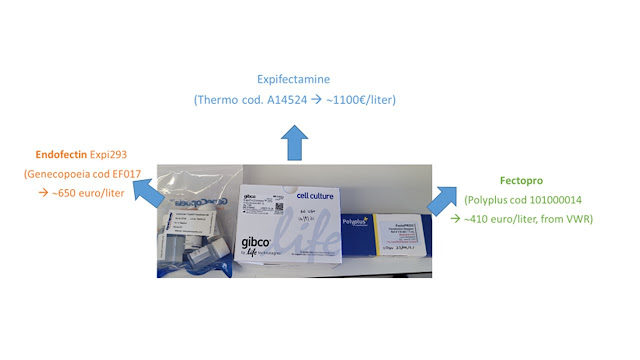Affinity chromatography which is based on the interaction the Fc region of the mAb molecule with specifi bacterial proteins as proteinA, proteinG or protein L immobilized on the resin is generally used for the isolation of antibodies from culture surnantants of the cell lines (eg CHO) used for their recombinant production.
The binding specificity and strength of protein A, protein G and protein L is not equally strong for all immunoglobulins and, in the case of IgG, not equal for all isotypes (Link1, Link2)
A generally stronger binding to the Fc region is observed by protein G, however higher binding strength however does not automatically result in better results since also the presence of impurities may influence the binding capacity.
In both, protein A and protein G affinity chromatography, the elution is carried out using a low pH buffer (eg glicine pH 2,7 for proteinG, and citrate pH3,0 for protein A). Generally in protein G chromatography, a stronger eluent is required to elute the captured antibody from the coloumn.
Thus, protein A chromatography is preferred over protein G since lower levels of impurities are generally obtained and it currently represent the gold standard in mAb pruficiation.
In general an efficient protein A resin should have:
- High dynamic binding capacity (able to bind large amounts of mAbs in a short time) which allow high flow-rate without losing mAbs in the flow-through
- High stability of the resin under regeneration with sodium hydroxide. The number of cycles you can run with the same resin has a huge economic impact;
Often, in the preliminary phases of the pre-clinical research, to identify the best mabs, scientists have to a large panel of different mabs in small amount (from ug to mgs). In absence of robotic platforms dedicated to mab purification, the gravity flow purification may represent a simple and powerful alternative.
Gravity flow purification require a resin with high porosity, rigidity and low backpressure to avoid resin clogging and guarantee reasonable flow-rate and purification timelines.
The Citivya rProteinA Fast flow resins (90uM of particle diameter), which represent the gold standard for the gravity flow purification of recombinant monoclonal antibodies is very expensive (more than 80euro/ml).
If it is true that this resin could be cleaned and re-generated several time and that thanks to its high binding capability (>35mg/ml) generally small volumes (100-500ul/sample) of resin are enough to purify mgs of mab samples requited in the preliminary mab screening phase i however its cost may have an high impact expecially in academic laboratories and the identification of an alternative resin with similar performances but low cost is preferable.
In this post i would like to share with you some enocuraging results that i have recently obtained with gravity flow purification by replacing the rprotA FF with the cheaper Mabselect resin which is reported to have
- similar binding capability (30mg/ml of Mabselect vs 35mg/ml of rproA FF)
and
- similar particle size (85um of Mabselect vs 90um of rproA FF)
but it is at least 5 time cheaper (25ml of mabselect cost = 5ml of rprotA resin)
Mab Select resin tested in the 2 following formats
format 1 (small) --> 75ul of resin in a Poliprep coloum (Biorad cod. #731-550)
format2 (medium) --> 750ul of resin in a PD-10 empty coloumn (GE cod. 17-0851-01)
showed flow rate very close to the FF (as you can see in the following videos: protA FF on the left, MAbselect on the right)
Video 1: Equilibration with buffer
Video 2: Expi-CHO surnatant loading
and similar results in terms of binding capacity and final mab purity level
In the following picture, 2 examples of purification performed with the MabSelect resin
In both cases the following buffers were used:
- Tris 2M pH=8 (1ml for 20ml culture) to correct the surnatant pH before coloumn loading;
- Equilibration and washing buffer; Tris 25mM, NaCl 25mM pH 7,2 buffer;
- Elution buffer: 300ul di Citrate 100mM NaCl 60mM pH=3;
- Tris 1M pH=9 (30ul for small size; 300ul for medium size) to neutralize the acid pH after elution
Of course there are many other interesting proteinA resins cheaper than the rProtA FF ND produded from suppliers different from Cytiva as Tosoh. Biorad, Thermo that could be also tested.
Personally, i selected the Mabselect since was the one with the particle size more close to the FF and i suspect that this detail can be essential to guarantee a good flow rare in gravity flow purification.













